Golden Retriever bloat, medically known as gastric dilatation-volvulus (GDV), represents one of the most serious emergency conditions that can affect our beloved Golden Retrievers. Understanding how to prevent twisted stomach in dogs can literally save your furry friend’s life. This comprehensive guide will walk you through proven prevention strategies, daily routines, and emergency preparedness specifically tailored for Golden Retriever owners.
Contents
- 1 Understanding Golden Retriever Bloat: Why Prevention Matters
- 2 Daily Preventive Measures: Building a Bloat-Prevention Routine
- 3 Exercise and Activity Guidelines for Bloat Prevention
- 4 Stress Management and Environmental Factors
- 5 Medication and Supplement Considerations
- 6 Emergency Preparedness: What Every Golden Retriever Owner Should Know
- 7 Long-Term Health Management Strategies
- 7.1 Weight Management Connection
- 7.2 Regular Veterinary Monitoring
- 7.3 What are the most effective ways to prevent twisted stomach in Golden Retrievers?
- 7.4 How long should I wait after feeding before exercising my Golden Retriever?
- 7.5 Can elevated feeding bowls prevent bloat in Golden Retrievers?
- 7.6 What should I do if I notice early signs of bloat in my Golden Retriever?
- 7.7 Are there specific foods that increase bloat risk in Golden Retrievers?
- 7.8 How can I tell if my Golden Retriever is eating too fast?
- 7.9 Is gastropexy surgery recommended for all Golden Retrievers?
- 8 Final Thoughts
Understanding Golden Retriever Bloat: Why Prevention Matters
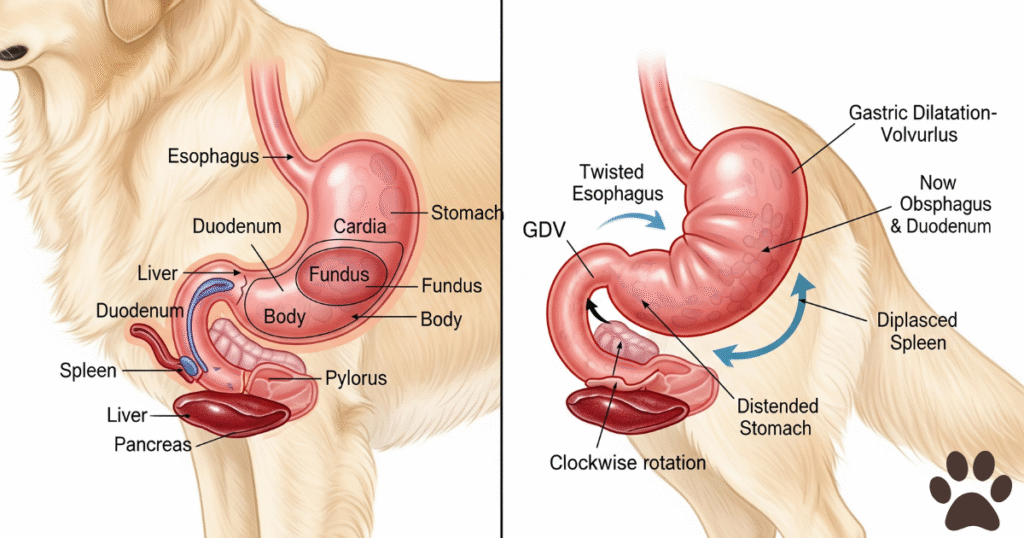
Golden Retrievers are among the breeds most susceptible to gastric dilatation-volvulus due to their deep chest structure and genetic predisposition. When we discuss how to prevent twisted stomach in dogs, we’re addressing a condition where the stomach fills with gas and potentially rotates, cutting off blood supply to vital organs.
The statistics are sobering: bloat affects approximately 2-3% of all Golden Retrievers during their lifetime, with larger, deeper-chested dogs facing even higher risks. Without immediate veterinary intervention, this condition can be fatal within hours. This makes prevention absolutely critical for every Golden Retriever owner.
Daily Preventive Measures: Building a Bloat-Prevention Routine
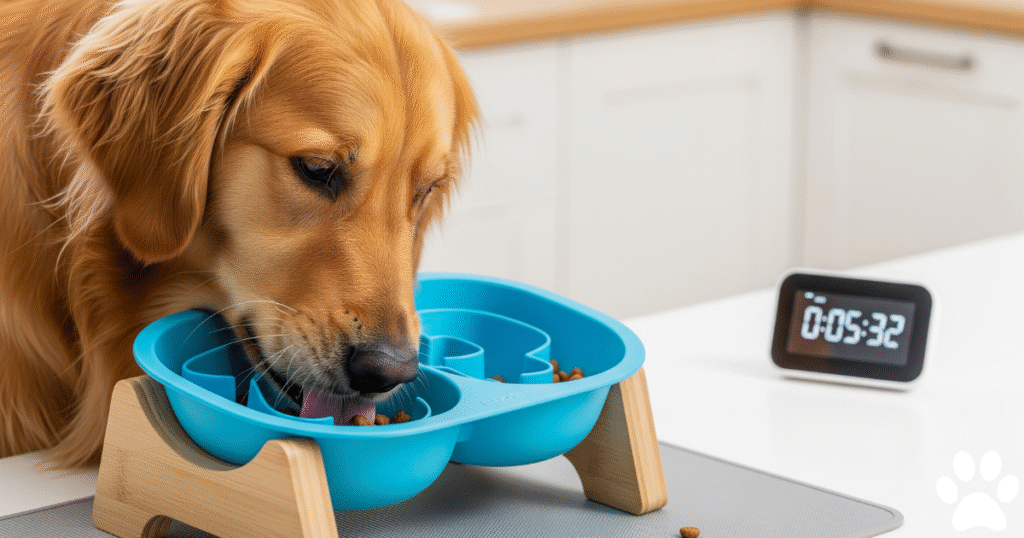
Feeding Strategies That Work
The foundation of how to prevent twisted stomach in dogs starts with proper feeding practices. Golden Retrievers are notorious for their enthusiastic approach to mealtime, but this eagerness can contribute to bloat risk.
Multiple Small Meals: Instead of feeding your Golden Retriever one or two large meals, divide their daily food intake into three to four smaller portions. This approach reduces the volume of food in the stomach at any given time, significantly lowering bloat risk.
Slow Feeding Solutions: Golden Retrievers tend to inhale their food, which introduces excess air into the stomach. Puzzle feeders, slow-feed bowls with ridges, or Kong toys stuffed with kibble encourage slower eating patterns. These tools force your dog to work for their food, naturally slowing consumption.
Elevated Feeding Considerations: While elevated feeders were once thought to prevent bloat, recent studies suggest they may actually increase risk in some large breeds. For Golden Retrievers, ground-level feeding is generally recommended unless your veterinarian advises otherwise for specific orthopedic reasons.
Water Management Protocol
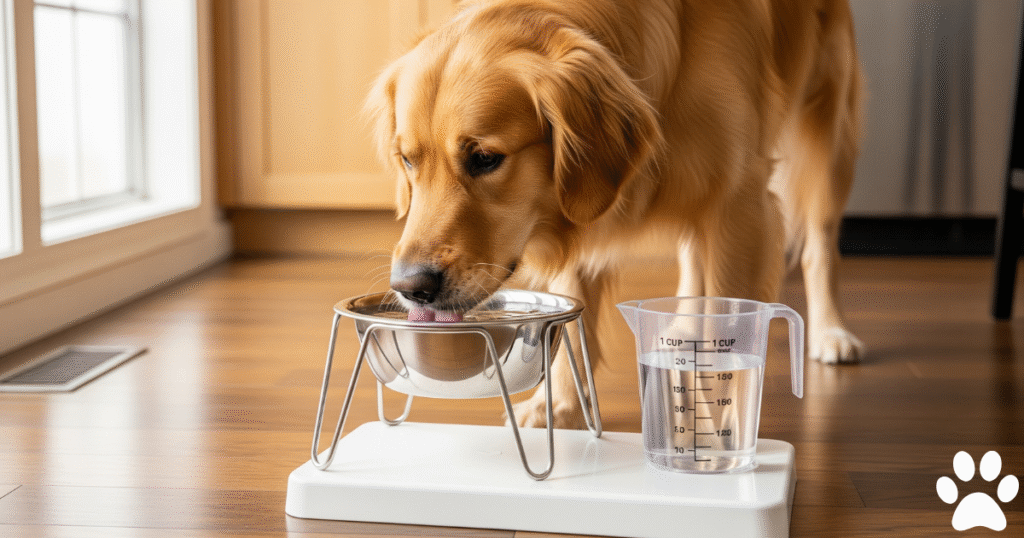
Water consumption plays a crucial role in how to prevent twisted stomach in dogs. Golden Retrievers should have constant access to fresh water, but managing intake around meal times requires attention.
Avoid allowing your Golden Retriever to drink large quantities immediately before or after meals. If your dog is extremely thirsty after exercise, offer small amounts of water at regular intervals rather than allowing unlimited gulping.
Exercise and Activity Guidelines for Bloat Prevention
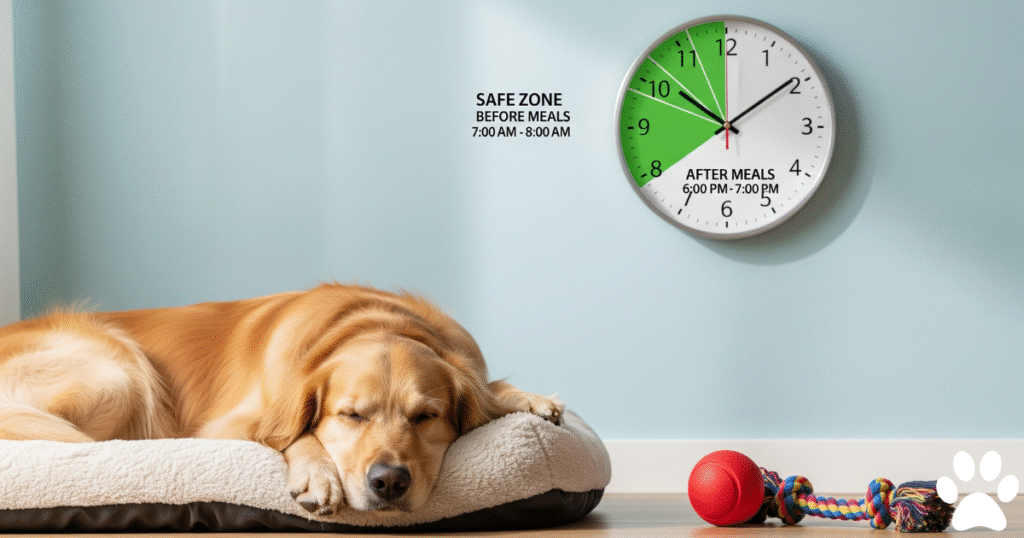
Pre and Post-Meal Exercise Restrictions
Understanding the relationship between exercise and meal timing is essential when learning how to prevent twisted stomach in dogs. Golden Retrievers are active dogs that love vigorous exercise, but timing is everything.
The Two-Hour Rule: Avoid vigorous exercise for at least two hours before and after meals. This includes running, jumping, wrestling, and intense play sessions. Light walking is acceptable and can even aid digestion, but avoid activities that cause your Golden Retriever to pant heavily or bounce around.
Morning Routine Adjustments: Many dog owners exercise their Golden Retrievers first thing in the morning before feeding. This timing actually works well for bloat prevention, as it allows the stomach to settle before introducing food.
Safe Exercise Alternatives During Restricted Times
When your Golden Retriever needs mental stimulation during post-meal rest periods, consider puzzle toys, gentle training sessions, or calm indoor activities. These alternatives keep your dog engaged without the physical intensity that could contribute to stomach twisting.
Stress Management and Environmental Factors
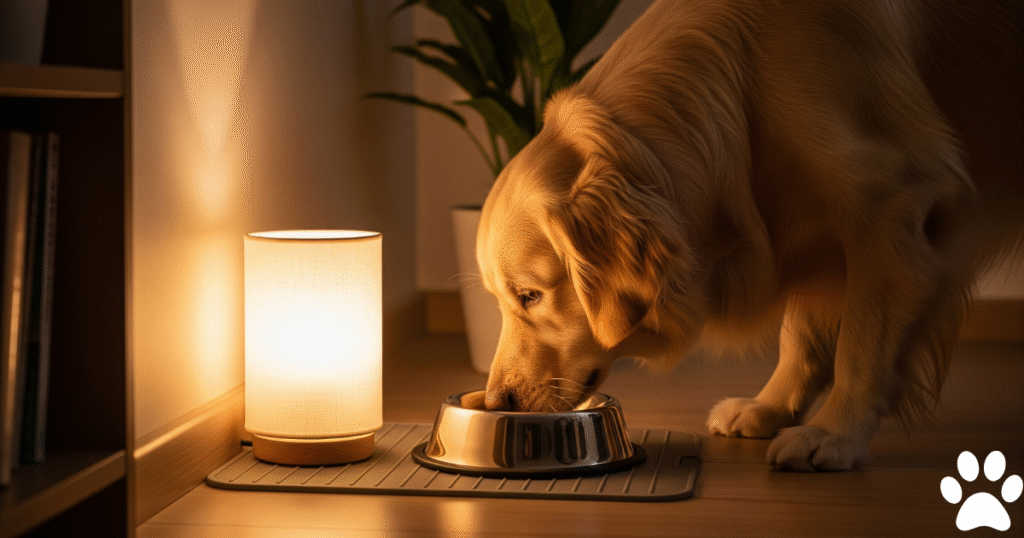
Creating a Calm Feeding Environment
Stress and anxiety can contribute to rapid eating and increased air swallowing, both risk factors for bloat. When considering how to prevent twisted stomach in dogs, environmental management becomes crucial.
Golden Retrievers should eat in a quiet, stress-free environment away from other pets that might create competition or anxiety. If you have multiple dogs, feed them separately to prevent resource guarding and competitive eating behaviors.
Consistent Feeding Schedule: Maintain regular meal times to reduce food-related anxiety. Golden Retrievers thrive on routine, and knowing when to expect meals can decrease the likelihood of anxious, rapid eating.
Medication and Supplement Considerations
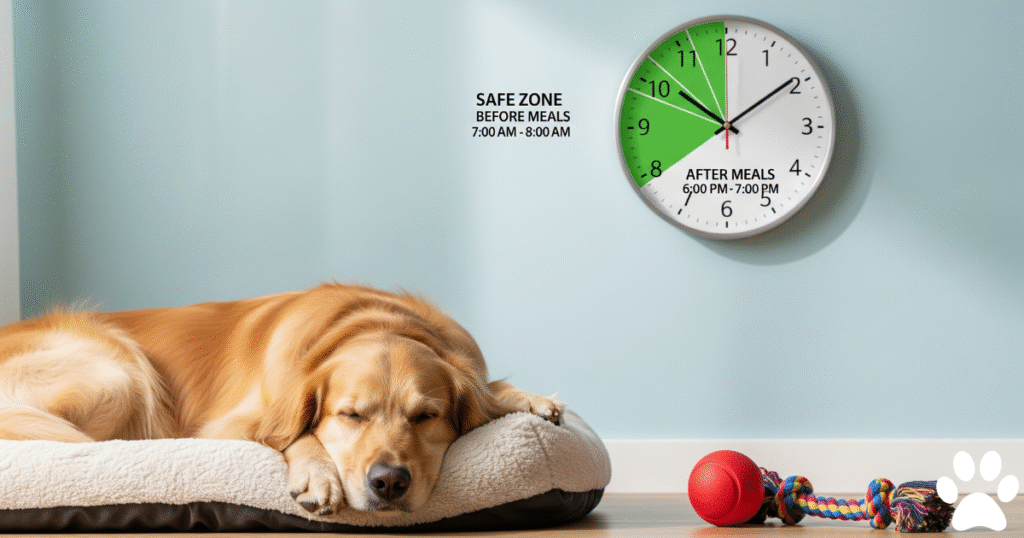
Veterinary Medications for High-Risk Dogs
For Golden Retrievers with extremely high bloat risk due to family history or previous episodes, veterinarians may recommend specific medications or procedures. Gastropexy, a preventive surgical procedure that attaches the stomach to the abdominal wall, is sometimes recommended for high-risk dogs.
Some veterinarians also recommend specific digestive enzymes or probiotics to support healthy digestion and reduce gas formation. Always consult your veterinarian before adding any supplements to your Golden Retriever’s routine.
Homemade Prevention Remedies
While no homemade remedy can replace proper veterinary care, some natural approaches may support digestive health as part of your overall strategy for how to prevent twisted stomach in dogs.
Ginger: Small amounts of fresh ginger (veterinarian-approved dosage) may help with digestion and reduce gas formation. However, never give ginger to pregnant dogs or dogs with certain medical conditions.
Pumpkin: Pure pumpkin puree (not pie filling) can support healthy digestion when added in small amounts to meals. The fiber content helps regulate digestion and may reduce gas buildup.
Emergency Preparedness: What Every Golden Retriever Owner Should Know
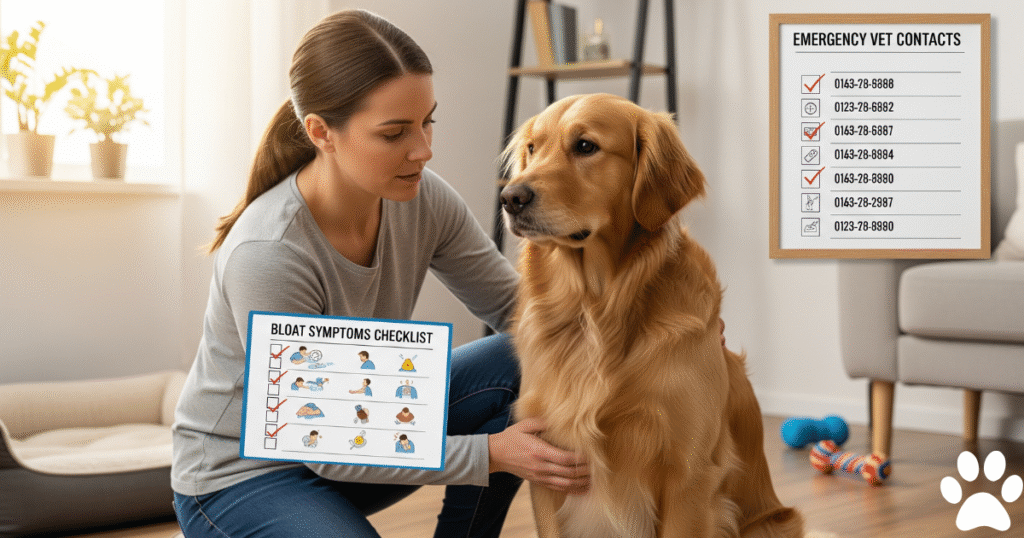
Recognition and Immediate Response
Even with the best prevention strategies, Golden Retriever owners must know how to recognize early bloat symptoms. Understanding how to prevent twisted stomach in dogs includes knowing when prevention has failed and emergency action is needed.
Early Warning Signs: Restlessness, attempted vomiting with no results, excessive drooling, enlarged abdomen, and obvious discomfort are all potential bloat indicators. Golden Retrievers may pace, whine, or assume unusual positions trying to find relief.
Emergency Protocol: If you suspect bloat, contact your emergency veterinarian immediately while transporting your dog to the clinic. Do not attempt to induce vomiting or give medications. Time is critical in bloat cases.
Long-Term Health Management Strategies
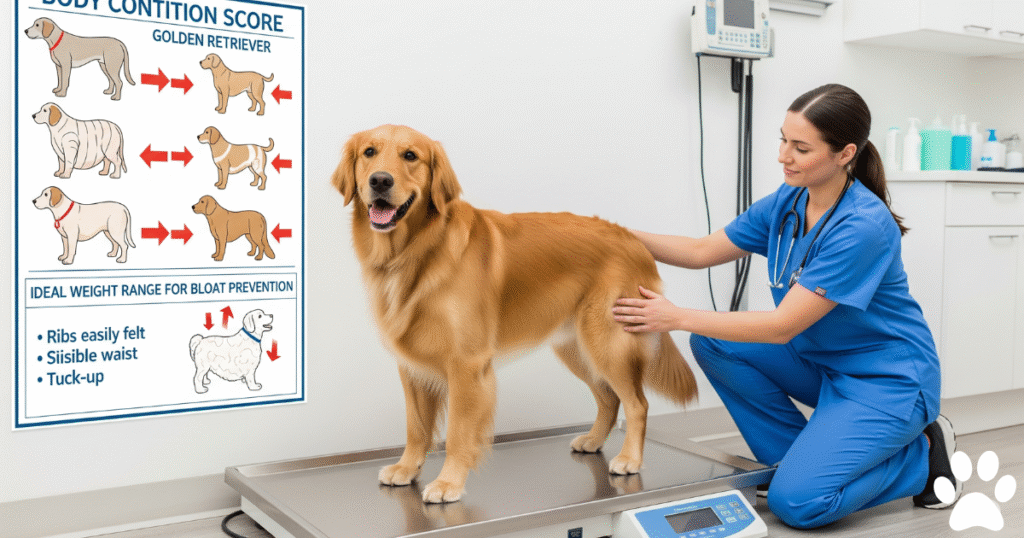
Weight Management Connection
Maintaining optimal weight reduces bloat risk in Golden Retrievers. Overweight dogs may be at higher risk due to increased abdominal pressure and reduced stomach mobility. Work with your veterinarian to establish and maintain an ideal weight for your Golden Retriever’s size and age.
Regular exercise, appropriate portion sizes, and quality nutrition all contribute to weight management and overall digestive health. When learning how to prevent twisted stomach in dogs, remember that overall health and fitness play supporting roles in prevention.
Regular Veterinary Monitoring
Schedule regular check-ups with your veterinarian to monitor your Golden Retriever’s digestive health and overall condition. Discuss bloat prevention strategies specific to your dog’s individual risk factors, including age, weight, eating habits, and family history.
What are the most effective ways to prevent twisted stomach in Golden Retrievers?
The most effective prevention methods include feeding multiple small meals daily, using slow-feed bowls, avoiding vigorous exercise within two hours of meals, maintaining a stress-free feeding environment, and keeping your Golden Retriever at optimal weight. Consistency with these practices significantly reduces bloat risk.
How long should I wait after feeding before exercising my Golden Retriever?
Wait at least two hours after feeding before allowing vigorous exercise. Light walking is acceptable immediately after meals and may aid digestion, but avoid running, jumping, or intense play until the two-hour window passes.
Can elevated feeding bowls prevent bloat in Golden Retrievers?
Current research suggests elevated feeding bowls may actually increase bloat risk in large, deep-chested breeds like Golden Retrievers. Ground-level feeding is generally recommended unless your veterinarian advises elevation for specific orthopedic reasons.
What should I do if I notice early signs of bloat in my Golden Retriever?
Contact your emergency veterinarian immediately and transport your dog to the clinic right away. Do not attempt home treatments, induce vomiting, or delay professional care. Bloat is a true emergency requiring immediate veterinary intervention.
Are there specific foods that increase bloat risk in Golden Retrievers?
Foods that are difficult to digest, high in fat, or cause excessive gas production may increase risk. Avoid feeding table scraps, foods with high air content, or allowing access to garbage. Stick to high-quality, easily digestible dog food appropriate for large breeds.
How can I tell if my Golden Retriever is eating too fast?
Signs of fast eating include gulping sounds, immediate movement to seek more food after finishing, competitive behavior around food, and visible air swallowing. If you can’t count individual bites or your dog finishes a meal in under two minutes, they’re likely eating too fast.
Is gastropexy surgery recommended for all Golden Retrievers?
Gastropexy is typically recommended for Golden Retrievers with extremely high bloat risk, such as those with family history of bloat or previous episodes. Discuss this preventive surgery with your veterinarian to determine if it’s appropriate for your individual dog based on risk factors.
Final Thoughts
Understanding how to prevent twisted stomach in dogs, particularly Golden Retrievers, requires commitment to daily prevention practices, environmental management, and emergency preparedness. By implementing these comprehensive strategies, Golden Retriever owners can significantly reduce their dog’s bloat risk while maintaining the active, healthy lifestyle these wonderful dogs deserve.
Remember that prevention is always preferable to treatment when it comes to bloat. Work closely with your veterinarian to develop a prevention plan tailored to your Golden Retriever’s specific needs, and never hesitate to seek emergency care if you suspect bloat symptoms. Your vigilance and preparation could save your Golden Retriever’s life.
Dr. Nabeel A.
Hi, I’m Dr. Nabeel Akram – a farm management professional by trade and a passionate Golden Retriever enthusiast at heart. With years of experience in animal science and livestock care, I’ve built a career around understanding animals—how they live, thrive, and bring value to our lives. This blog is a personal project born from that same passion, focusing on one of the most loyal and lovable breeds out there: the Golden Retriever. Whether I’m managing farm operations or sharing insights on canine health, behavior, and care, it all ties back to one core belief—animals deserve thoughtful, informed, and compassionate attention. Welcome to a space where professional expertise meets genuine love for dogs.
Facebook |
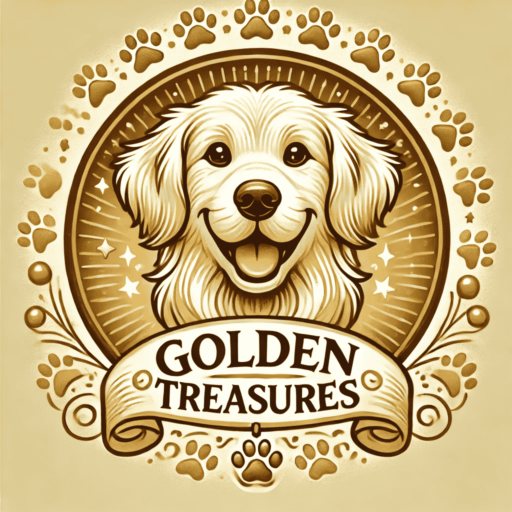
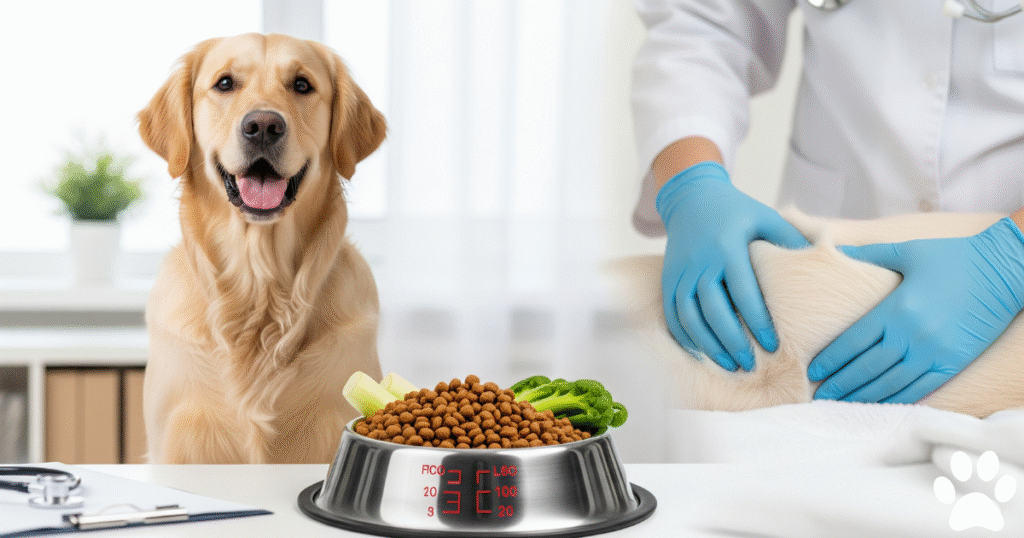
Links will be automatically removed from comments.